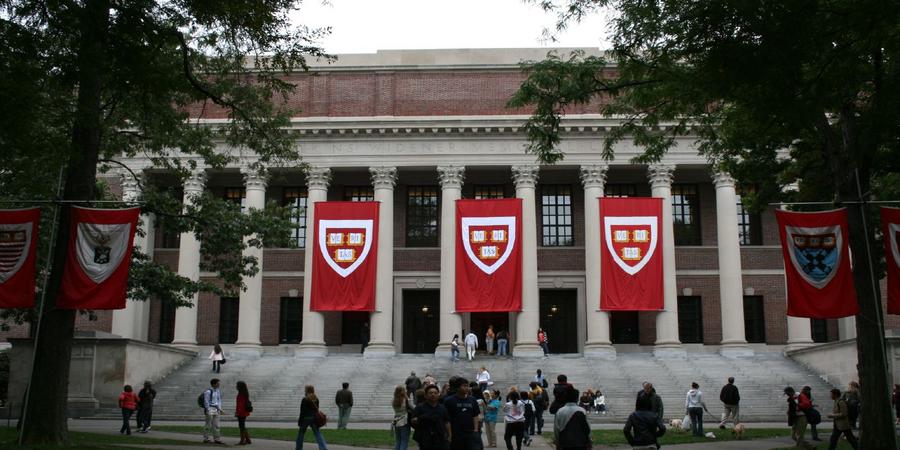Harvard University
- University
- College
- Full-time
- Part-time
- Hybrid
- Online
- english
About the Harvard University
Harvard University is one of the most prestigious and well-known educational institutions in the world. Founded in 1636, Harvard is the oldest university in the United States and holds a leading position in the global educational system. Its graduates hold high positions in government, business, science, and the arts, making the university a true forge of leaders. History of the institution Harvard was founded in Cambridge, Massachusetts, for the purpose of preparing clergy, but quickly developed into a university with a wide range of disciplines. Named in honor of the Reverend John Harvard, who donated his books and half his estate to the institution, Harvard played a key role in the development of American higher education. Key events and achievements: In the 1780s, Harvard played an important role in the creation of the U.S. Constitution. In the 19th and 20th centuries, the university became a global leader in areas such as law, business, medicine, and the arts. Harvard's achievements include 160 Nobel Prize laureates, numerous notable alumni, including 8 U.S. presidents and hundreds of global leaders. Educational philosophy and approaches to teaching Harvard's educational philosophy is based on liberal education, which focuses on the all-round development of students. The university emphasizes critical thinking, analytical skills, and the ability to make informed decisions. Key approaches to teaching: Interactive learning: The university encourages dialogue between students and faculty, creating an enriched educational environment. Research activity: Harvard is a global leader in research and innovation. Students participate in real projects, giving them practical experience. Interdisciplinary: Harvard's programs integrate different disciplines, promoting a deep understanding of complex issues. Global perspective: Harvard promotes the development of international relations so that students can think on a global level. Role and significance in the educational system Harvard University is not only a leading educational institution in the United States, but also a global leader in education. It is part of the Ivy League, representing the pinnacle of academic education and scientific research. Harvard's influence extends to many areas, from business and law to medicine and technology. The university actively collaborates with leading global institutions, develops new educational programs, and influences the development of international education. Harvard has a colossal impact on shaping educational standards worldwide, and its research centers and publications influence global scientific and academic discourses. The university also actively supports innovation through its numerous laboratories and startup incubators.
MoreLoading...
Admission conditions in Harvard University
Age: Candidates must usually be at least 17 years old at the time of admission. Taking exams: In order to apply, standardized tests must be passed: SAT or ACT (official results must be provided). For international students whose native language is not English, TOEFL or IELTS must be taken to demonstrate English proficiency. Application: Submit an application through Common Application or Coalition Application. The deadline for undergraduate applications is usually November 1st for early action and January 1st for regular decision. Application fee: 75 USD (application fee) – through the platform where the application is submitted. Waiver of the fee is possible if there are financial difficulties. High school diploma: Foreign students must provide an official translation of their diploma, certified by the school or an official institution. The diploma must include midterm and annual grades (if required in the country of study). Recommendations: Two recommendations from teachers are mandatory (one in humanities and one in science). An additional recommendation from a school counselor may be required. Personal statement: It is necessary to write a Personal Statement, which is an important part of the application. Essay topics are specified on the application platform. Additional documents for international students: A School Report is required – with midterm and final grades certified by the school. A translation of grades for the last 3-4 years of study may also be required (if the original documents are not in English). Confirmation of financial status: Foreign students must confirm their ability to pay for their education by providing a bank statement or another document confirming financial guarantees. However, Harvard provides financial aid based on need, so financial documents are only needed to assess the possibility of assistance. Interview (optional): If possible, candidates may be offered an interview with a Harvard graduate or admissions representative. Additional materials (if applicable): Students may submit a portfolio (in case they are applying for programs related to art, music, theater, etc.).
MoreMinimum rating for admission to Harvard University
The minimum rating for admission to Harvard University is not officially set, as the university uses a holistic approach in reviewing applications. This means that many factors besides academic indicators, such as recommendations, extracurricular achievements, essays, and personal qualities, influence the decision on enrollment. However, successful candidates usually have the following academic indicators: SAT: 1400–1600 out of 1600 points (the average score of successful applicants is often closer to the upper limit). By sections: Evidence-Based Reading and Writing: 720-780 Math: 740-800 ACT: Average score of successful applicants: 33-36 out of 36. Average GPA (Grade Point Average): The average GPA of successful applicants is around 3.9–4.0 on a 4.0 scale, which corresponds to an A grade.
MoreProspects after completing studies in Harvard University
After completing their education at Harvard University, graduates have a wide range of opportunities and prospects that open up to them thanks to the high quality of education and strong network of contacts. Harvard holds leading positions in various fields, including business, law, medicine, science, and art, allowing graduates to find highly qualified positions in their industries. Many graduates continue their education in graduate programs, especially in prestigious programs such as MBA, JD or MD. Harvard graduates often become leaders in their fields, holding key positions in large corporations, government agencies, and international organizations. The strong critical thinking skills and innovative approach acquired at the university make them valuable assets in the job market. Furthermore, graduates gain access to an extensive network of like-minded individuals and alumni, creating additional opportunities for professional growth and collaboration. Overall, studying at Harvard opens doors to a successful career and opportunities for personal development.
MoreTitle | Age | Period |
|---|---|---|
| Bachelor in African and African American Studies | 17+ | 3 years |
| Bachelor in Anthropology | 17+ | 3 years |
| Master in Anthropology | 20+ | 1 year |
| Bachelor in Applied Mathematics | 17+ | 3 years |
| Bachelor of Fine Arts in Film | 17+ | 3 years |
| Bachelor in Astrophysics | 17+ | 3 years |
| Bachelor in Bioengineering | 17+ | 3 years |
| Bachelor in Biology | 17+ | 3 years |
| Master of Science in Biology | 20+ | 1 year |
| Bachelor in Biomedical Engineering | 17+ | 3 years |
| Bachelor of Business Administration | 17+ | 3 years |
| Bachelor in Chemical and Physical Biology | 17+ | 3 years |
| Bachelor in Chemistry | 17+ | 3 years |
| Bachelor of Science in Physics | 17+ | 3 years |
| BA Classics | 17+ | 3 years |
| Bachelor in Comparative Literature | 17+ | 3 years |
| Bachelor in Computer Science | 17+ | 3 years |
| Master in Computer Science | 20+ | 1 year |
| Bachelor in Creative Writing and Literature | 17+ | 3 years |
| Master in Creative Writing and Literature | 20+ | 1 year |
| Bachelor of Drama and Theatre Arts | 17+ | 3 years |
| Bachelor in Earth Sciences | 17+ | 3 years |
| Bachelor in East Asian Studies | 17+ | 3 years |
| Bachelor of Science in Economics | 17+ | 3 years |
| B.Sc. in Electrical Engineering | 17+ | 3 years |
| Bachelor of Arts in English Language | 17+ | 3 years |
| Master of Arts in English Language | 17+ | 3 years |
| Bachelor of Environmental Studies | 17+ | 3 years |
| Bachelor in Folklore and Mythology | 17+ | 3 years |
| Bachelor in Germanic Languages and Literatures | 17+ | 3 years |
| Bachelor of Arts in Government | 17+ | 3 years |
| Master of Arts in Government | 20+ | 1 year |
| Bachelor of Arts in History | 17+ | 3 years |
| Master of Arts in History | 20+ | 1 year |
| Bachelor in History of Art | 17+ | 3 years |
| Bachelor in Biology | 17+ | 3 years |
| Bachelor of Arts in International Relations | 17+ | 3 years |
| Master of Arts in International Relations | 20+ | 1 year |
| Bachelor in Journalism | 17+ | 3 years |
| Master in Journalism | 20+ | 1 year |
| Bachelor in Linguistics | 17+ | 3 years |
| Bachelor in Materials Science | 17+ | 3 years |
| Bachelor's in Mathematics | 17+ | 3 years |
| Bachelor in Neuroscience | 17+ | 3 years |
| Bachelor of Psychology | 17+ | 3 years |
| Master of Psychology | 20+ | 1 year |
| BA Sociology | 17+ | 3 years |
| Bachelor in Women, Gender, and Sexuality | 17+ | 3 years |
Leave a review
Loading...















Reviews
Great academic atmosphere and top-level professors. A life-changing experience!
Read in fullHello! Here on the site it is written that you are the official representatives of this university and can assist with the submission of documents. Is this true?
Read in fullIt is written that only 18 people are accepted for undergraduate studies. But what if you are 17?
Read in fullAre there free training or discounts? And what you need for admission. After school I want to enter from Kyrgyzstan.
Read in full